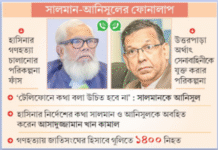Leaders and activists of the Bangladesh Nationalist Party got access to their central office on Saturday evening more than three months after law enforcement agencies had locked it.
A group of BNP leaders and activists, led by its assistant office secretary Asadul Karim Shahin, entered the office by breaking open the collapsible gate. But regular activities in the office did not resume as it was out of electricity, telephone and water connections.
The BNP central office at Naya Paltan, which was locked by the police on January 3, reopened a day after policemen deployed in front of it were withdrawn on Friday.
The police withdrew from the party office after BNP and pro-BNP professionals last week placed a number of demands, including reopening of its central office and an end to harassment of its leaders and activists to ensure free and fair elections to the three city corporations on April 28.
The police allegedly locked the BNP central office on the night of January 3, with a huge deployment of law enforcers putting it under a virtual siege ahead of a rally the party had planned in the city for January 5 marking the first anniversary of the 2014 elections boycotted by major opposition parties.
The police on March 26 even refused the BNP permission to hoist the national flag atop the party’s central office on the Independence and National Day.
Since January 6, the alliance has been enforcing a nonstop countrywide blockade, the 89th day of which passed off on Saturday, to press
for fresh general elections under a non-party government. The alliance also enforced frequent hartals in addition to the blockade.
About 134 people were killed in political violence since January 5. Of the victims, 73 transport workers or passengers were killed in arson attacks by suspected blockaders and 40, mostly opposition activists, were killed by police.
At about 7:30pm on Saturday, party leaders led by its assistant office secretary Asadul Karim Shahin went to the central office and found that the lock that the BNP used had been replaced. ‘Police had replaced the lock and did not provide us with the key forcing us break the doors open,’ said Asadul Karim.
‘We entered the office but could not resume activities as it was out electricity, telephone and water connections,’ he said.
The BNP activists said they had found thick layers of dust in the rooms and papers strewn on the floors.
About 15 BNP leaders and activists were present at the office until 8:45pm.
No police or Rapid Action Battalion personnel were found in front of the party office in the evening but police were still on guard in front of a nearby building.
As many as 11 front and associate organisations of BNP are housed in the party’s four-storied building.
Party activities and communications were carried out from the BNP chairperson Khaleda Zia Gulhshan office, which was also besieged by police from January 3 to 20, during
the period, party sources said.
Although the police withdrew the siege of Khaleda’s Gulshan office on January 20, she continued staying at the office until Saturday evening.
Police at different times during that last six years besieged the BNP central office as well as controlled entry into the office during or ahead of various anti-government programmes.
The BNP-led alliance on Saturday announced a countrywide protest rally and procession for today alongside the current blockade demanding ‘return’ of the party joint secretary general Salah Uddin Ahmed and all opposition leaders and activists who, it said, became victims of ‘enforced disappearance.’
The alliance in a statement signed by BNP joint secretary general Barkat Ullah Bulu announced the programme.
A group of BNP leaders and activists, led by its assistant office secretary Asadul Karim Shahin, entered the office by breaking open the collapsible gate. But regular activities in the office did not resume as it was out of electricity, telephone and water connections.
The BNP central office at Naya Paltan, which was locked by the police on January 3, reopened a day after policemen deployed in front of it were withdrawn on Friday.
The police withdrew from the party office after BNP and pro-BNP professionals last week placed a number of demands, including reopening of its central office and an end to harassment of its leaders and activists to ensure free and fair elections to the three city corporations on April 28.
The police allegedly locked the BNP central office on the night of January 3, with a huge deployment of law enforcers putting it under a virtual siege ahead of a rally the party had planned in the city for January 5 marking the first anniversary of the 2014 elections boycotted by major opposition parties.
The police on March 26 even refused the BNP permission to hoist the national flag atop the party’s central office on the Independence and National Day.
Since January 6, the alliance has been enforcing a nonstop countrywide blockade, the 89th day of which passed off on Saturday, to press
for fresh general elections under a non-party government. The alliance also enforced frequent hartals in addition to the blockade.
About 134 people were killed in political violence since January 5. Of the victims, 73 transport workers or passengers were killed in arson attacks by suspected blockaders and 40, mostly opposition activists, were killed by police.
At about 7:30pm on Saturday, party leaders led by its assistant office secretary Asadul Karim Shahin went to the central office and found that the lock that the BNP used had been replaced. ‘Police had replaced the lock and did not provide us with the key forcing us break the doors open,’ said Asadul Karim.
‘We entered the office but could not resume activities as it was out electricity, telephone and water connections,’ he said.
The BNP activists said they had found thick layers of dust in the rooms and papers strewn on the floors.
About 15 BNP leaders and activists were present at the office until 8:45pm.
No police or Rapid Action Battalion personnel were found in front of the party office in the evening but police were still on guard in front of a nearby building.
As many as 11 front and associate organisations of BNP are housed in the party’s four-storied building.
Party activities and communications were carried out from the BNP chairperson Khaleda Zia Gulhshan office, which was also besieged by police from January 3 to 20, during
the period, party sources said.
Although the police withdrew the siege of Khaleda’s Gulshan office on January 20, she continued staying at the office until Saturday evening.
Police at different times during that last six years besieged the BNP central office as well as controlled entry into the office during or ahead of various anti-government programmes.
The BNP-led alliance on Saturday announced a countrywide protest rally and procession for today alongside the current blockade demanding ‘return’ of the party joint secretary general Salah Uddin Ahmed and all opposition leaders and activists who, it said, became victims of ‘enforced disappearance.’
The alliance in a statement signed by BNP joint secretary general Barkat Ullah Bulu announced the programme.
Source: New Age










